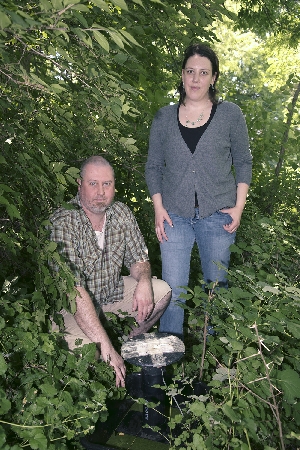Western Illinois Mosquitoes Create Plentiful Research Opportunities for WIU Students
February 27, 2017

WIU doctoral student Jason Hunt and WIU Biological Sciences Assistant Professor Catherine Miller-Hunt
[Download Print-Quality Image]
MACOMB, IL – It's ironic to realize that the pesky mosquito, which can ruin time spent outdoors, has helped create a unique partnership that is offering academic and research opportunities to Western Illinois University faculty and students and, in turn, assisting local health departments combat the diseases the flying, biting insects carry.
One of those students, Jason Hunt, of Vermont, IL, is studying for his doctoral degree in Environmental Science with the Institute for Environmental Studies, directed by Roger Viadero, on the WIU Macomb and Quad Cities campuses. As part of that education, he is researching the types of mosquitoes invading west central Illinois and the problems and diseases they bring with them.
Hunt is married to WIU Biological Sciences Assistant Professor Catherine Miller-Hunt, who is also doing mosquito research with her students in the field and in her laboratory at Western.
For the past four years, Hunt and Miller-Hunt have been researching the mosquito population in four Illinois counties: McDonough, Fulton, Schuyler and Cass. This summer, they will add Hancock County to their research list.
As part of this work, Hunt has won two student research awards at conferences in Iowa and Illinois. In April 2016, he won first place for his presentation at the Fifth annual Great Plains Emerging Infections Diseases Conference in Iowa City, IA, and he recently tied for second place in the oral presentation category in the Illinois Mosquito Vector Control Association meeting in Springfield, IL.
The tie for second place was with WIU student Kennen Hutchison, a senior biology major from Orion, IL. Hutchison will begin work on a doctoral degree in virology at Northwestern University in Fall 2017. Miller-Hunt said WIU has won prizes at the Springfield meeting three years in a row.
In addition to his research at Western, Hunt is also an adjunct faculty member at Carl Sandburg College, where he teaches dual-credit biology and zoology classes to students at West Prairie High School three days each week.
Hunt and Miller-Hunt came to Macomb in Summer 2013, after Miller-Hunt accepted a faculty position at Western. Miller-Hunt, a Macomb High School graduate, received her undergraduate degree from Western in biology in 2002. She then went on to get her master's and doctoral degrees from the University of Iowa, where she met Hunt.
Miller-Hunt attended high school with McDonough County Health Department Director of Environmental Health Chris Adams.
"Catherine and Chris were talking about mosquitoes and screening for West Nile virus and worked out a way WIU students could help with it," said Hunt.
In 2014, collection and testing of mosquitoes began in McDonough and Fulton counties and parts of Cass County. In 2015, Schuyler County was added to the list, and in 2016 the entirety of Cass County was taken on.
"We are collecting mosquitoes in traps," said Hunt. "Then we are screening for West Nile Virus. While we are testing, we are finding different species that haven't been reported in this area before."
Among the mosquito species being watched for are the invasive Aedes aegypti mosquito, which is capable of carrying the Zika virus. Hunt said these types of mosquitoes have been found just over Illinois' southern border in Kentucky. One of the students working on the mosquito research is originally from that area and her parents have agreed to put a mosquito trap in their yard to track the mosquito population and movement.
"This is also impacted by climate change," said Hunt. "As the temperature rises, we see a range of expansions. A degree or two difference could allow the Aedes aegypti to invade."
The research by the husband and wife team has presented a variety of opportunities to students at Western and in other academic areas. The initial idea of studying mosquitoes was initially brought to Miller-Hunt by one of her students and has vastly expanded from there.
Students in Miller-Hunt's classes assist with the research, including those in a Summer 2016 class on vector biology and mosquitoes and ticks, taught at WIU's Kibbe Life Science Station, near Warsaw, IL. Hunt said students in his West Prairie dual-credit classes also help with the work.
Both Hunt and Miller-Hunt say the best way to keep the mosquito population down is to avoid allowing standing water. They added that mosquito eggs can be laid and hatched in two-three days.
"The best thing is to target the larvae; no standing water in containers large or small," said Miller-Hunt. "You can buy something called Bti (Bacillus thuringiensis subspecies israelensis), which is a bacteria to put in water sources, like ponds or gutters. It's non-chemical and doesn't harm animals. For people, the best thing is bug spray."
The research team also conducts public outreach to educate people about protecting themselves from the diseases mosquitoes carry.
Hunt has about two years of study left to receive his doctoral degree. He is currently waiting to learn about his application for a National Science Foundation Fellowship, which would allow him to work on his research full time. An announcement about the fellowship awards is expected in March or April.
The Environmental Sciences graduate program began in Fall 2014 and is the newest doctoral program at Western Illinois University and is directed by Viadero.
For more information about the graduate program, visit wiu.edu/cas/ies/esphd.php. For more information about the mosquito research at Western, visit bit.ly/2920ml0.
Posted By: Jodi Pospeschil (JK-Pospeschil@wiu.edu)
Office of University Communications & Marketing

Connect with us: